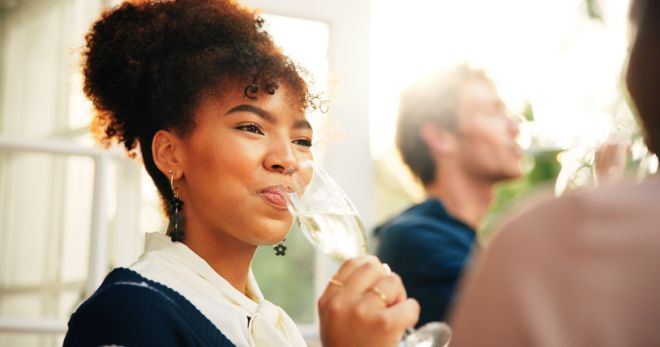Zebra Striping: Try This Drinking Hack To Avoid A Hangover
Forget Hangovers—‘Zebra Striping’ Is The Drinking Trick Every Hot Girl Needs To Know

If you want to drink but are trying to avoid an extreme hangover the next day, try this new hack called “zebra striping.”
According to Vogue writer, Daisy Jones, the technique helps pace your drinking, allowing you to avoid the dreaded next-day hangover. The idea is simple: for every alcoholic drink you have, follow it with a non-alcoholic one. For instance, sip on a gin and tonic, then chase it with a glass of water. Planning to have a couple more? Keep alternating. Every boozy beverage should be balanced with something hydrating.
The key is to stay mindful and set a personal limit based on your tolerance.
RELATED CONTENT: 7 Black Women-Owned Non-Alcoholic Beverage Brands That Preserve The Pizzazz Of Black Girl Magic Without The Hangover
The benefits don’t stop there. Jones noted that this method helps you slow down your alcohol intake over the course of the night. It’s ideal for those of us who tend to sip constantly just to have something in our hands. It also works well if you want to stay socially engaged without overindulging, perfect for long evenings out with friends or professional gatherings where you’d like to feel relaxed but still sharp.
Best of all, you get to enjoy the night without waking up to a pounding headache or dehydration.
If alcohol isn’t your thing at all, you’re not out of options. Try a mocktail or one of the many non-alcoholic beers and wines on the market today, many of which taste impressively close to the real deal. One standout is Propio, a de-alcoholized wine alternative created by Spelman alumnae, Cassi Davis and Mikaela Funn. It offers the full-bodied flavor and complexity of traditional wine, minus the alcohol. Perfect for sipping with style.

Limiting alcohol or abstaining entirely has tons of health benefits
Zebra striping is also a smart option for those looking to be more health-conscious with their drinking habits. Many members of Gen Z, for example, are embracing the “sober curious” movement, reconsidering their relationship with alcohol in favor of prioritizing mental health, personal goals and overall well-being. They’re also more aware than previous generations of the risks associated with binge drinking.
As previously reported, Karen Tyrell, CEO of the alcohol education charity, Drinkaware, highlighted these dangers in a 2024 interview with Newsweek. She explained that high-intensity drinking is especially harmful because the human body can typically process only about one unit of alcohol per hour—and for some individuals, even less. Overloading your system beyond that can lead to serious health consequences.
“By drinking a lot quickly, the amount of alcohol in your bloodstream can stop your body from working properly,” Tyrell explained. “This puts you at serious risk of accidents, alcohol poisoning and other short- and long-term health issues. Don’t do it.”

A 2018 study highlighted the significant risks associated with high-intensity drinking, which include alcohol-related injuries, alcohol poisoning, risky sexual behavior, and vomiting among other dangers. So, going alcohol free can prevent these risks.
Notably, a 2018 study published in BMJ Open explored the health effects of short-term alcohol abstinence. Researchers recruited healthy adults who regularly consumed more than 64 grams of alcohol per week for men and 48 grams for women. Participants were divided into two groups: one continued drinking as usual, while the other abstained from alcohol for a month.
After just four weeks, those who gave up alcohol saw major health improvements. They showed enhanced insulin sensitivity—an important factor in blood sugar regulation—and some experienced modest weight loss. The abstinent group also recorded lower blood pressure and a significant reduction in certain growth factors associated with increased cancer risk.
So, what do you say? Will you be giving zebra striping a try, or, ditching alcohol for good?
RELATED CONTENT: What Happens To Your Body When You Stop Drinking Alcohol For 1 Month












